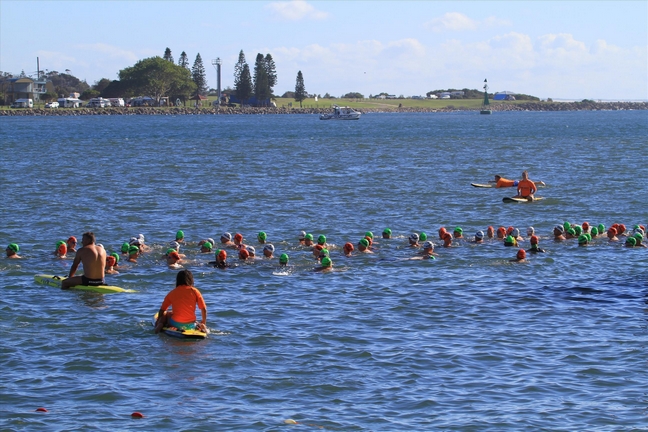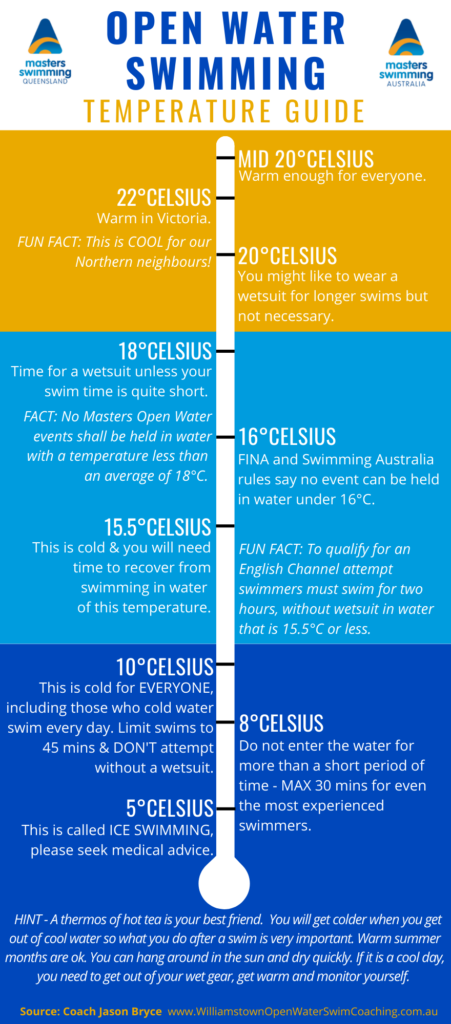
Open Water Swimming is popular among members of Masters Swimming. Some members compete in OWS organised by Triathlon clubs, Surf Life Saving, interstate clubs and some travel overseas to compete in events in different parts of the world. This page offers open water swimmers information on anything to do with OWS.
In Brisbane, our members are lucky to be able to access the Grimsey’ Adult Swimfit. The organisation is run by brothers Codie and Trent Grimsey, both avid open water swimmers. Trent holds the record for the fastest English Channel crossing, which he achieved in 2012.
Note: MSA Open Water Swim Rules Open Water Swimming Tips for Masters’ Swimmers (Grimsey Brothers)
Website: www.grimseyadultswimfit.com
Email: info@grimseyadultsswimfit.com
Start:
- On the start line always position yourself directly beside the fastest swimmer in the field.
- When the race begins, get in the slip steam of that swimmer straight away (directly behind him or her) and stay there for as long as you can.
- Don’t be aggressive (it wastes too much energy).
- Think happy thoughts.
Pack Swimming:
- Packs will always be very tight and rough. If you’re a stronger swimmer, you can get away with swimming on the outside of the pack, where there will be a little less drag. You will have a lot more room to move and will not have to be jostling with somone either side of you the whole way. If you’re a weaker swimmer it will be more beneficial to sit in the middle of the pack working as hard as you can to stay there. Getting dropped can make it a long and lonely swim.
- If someone hits you or is annoying, you don’t hit or annoy them back – just swim away from them. If you get angry with them, it will take your focus and energy from your race. Don’t even try and look at who it is as it will only make you even angrier. Just swim away from them and pretend it never happened.
- Conserve, conserve, conserve
- When you’re swimming in the pack, you shouldn’t have to lift your head to sight buoys much at all. The person leading the pack will do that and everyone else just follows him/her.
- If you’re leading the pack, lift your head every 4 – 6 strokes just to make sure you’re keeping a straight line.
Turning Buoys:
Turning buoys are the most important thing in any race. They’re where you can make up a lot of ground or potentially lose a lot of ground
- When turning a buoy, you want to be as close to the buoy as possible (the closer you are to the buoy, the less distance you have to swim).
- All you actually have to swim around is the rope that holds the buoy in place. (Watch some of the surf guys next time you see them racing on TV. They duck under the buoy and grab the rope pullilng themselves around it). By doing this you can go from maybe 15th place to 5th place in a couple of seconds.
- Do not lift your head when turning a buoy (unless you want it knocked off).
- 15 – 20 metres before a turning buoy, pick up the pace. You want to have fast momentum when turning a buoy.
- Things will get rough around the buoys, but hold your ground and you’ll be fine.
Last Turning Buoy (home straight)
- When you turn at the last buoy, you will be hurting, but you have to remember that everyone else is hurting just as much as you are.
- If you can see it’s going to come down to a sprint finish and you’re in front, start to zigzag. This will keep people from overtaking you.
- If it comes down to a sprint finish, don’t be afraid to get a bit physical (this is the only time it’s okay to get physical with one of your competitors). It’s better if you start getting physical with them before they start getting physical with you. This way they know you’re in control of the race, not them. It’s also letting them know you won’t be a pushover.
Things To Remember
- Simplicity… keep it simple.
- When you feel yourself starting to hurt or fall apart, whether it is in training or during a race, go back to basics. Remember all the small things (the catch, the pull, touching your thumb on your thigh every stroke, high elbows, body position…).
- Only worry about things you can control… you can’t control your competitors – so don’t worry about them.
- In open water swimming the fastest doesn’t always win or come out of the water first, the smartest does. Race smart!


